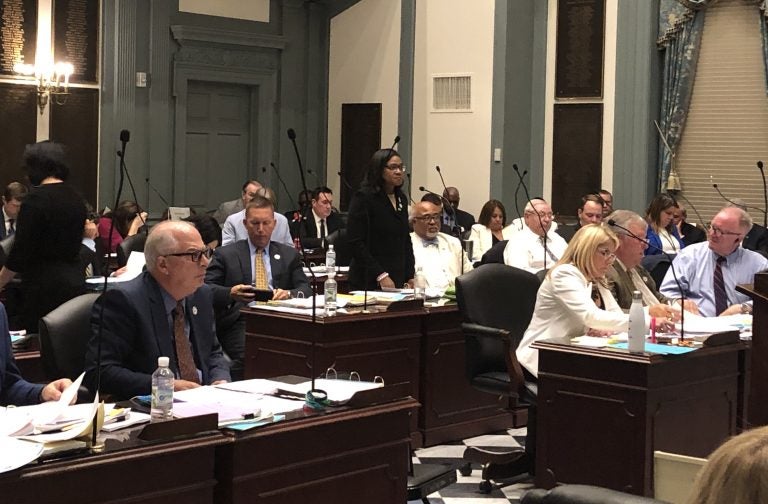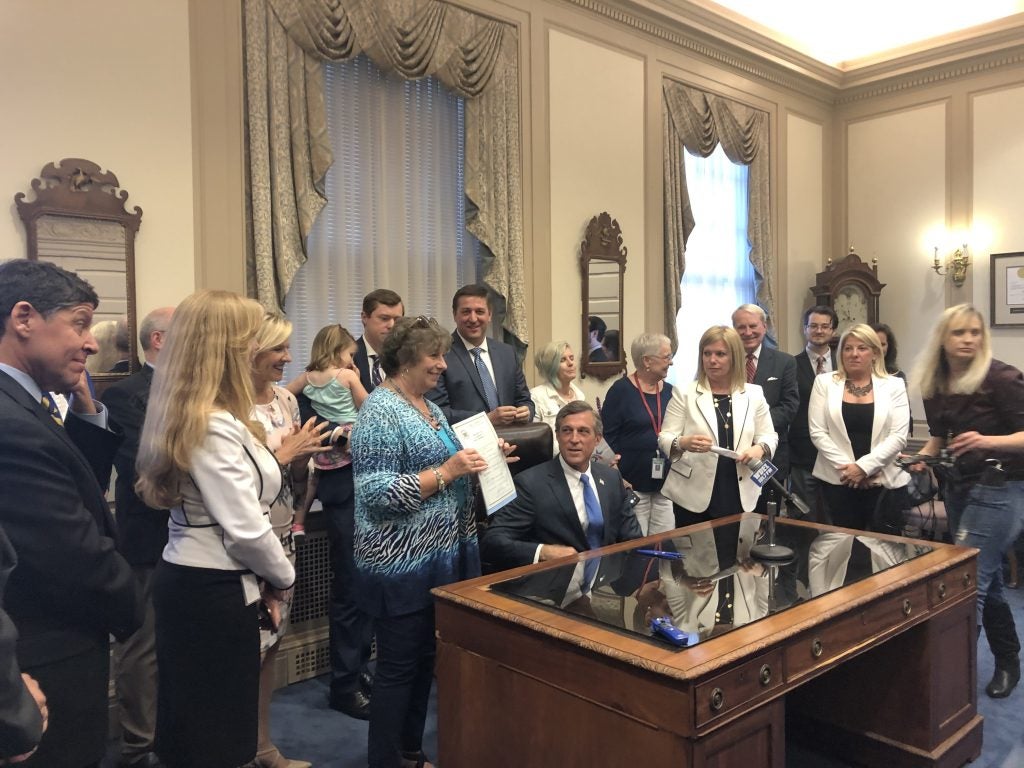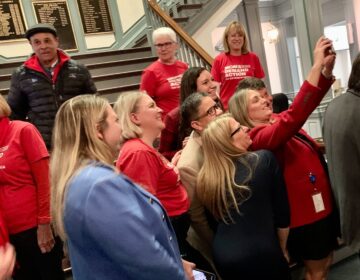Delaware Legislature ends session, and for once, it’s not in the wee hours
Last year Delaware lawmakers bickered until 8 a.m. before passing the final budget bill. This year they promised an earlier finish, and did it.

Delaware lawmakers worked into the overnight hours of July 1 to finish their legislative work for the year. (Cris Barrish/WHYY)
Delaware lawmakers unanimously approved an $863 million budget for major road, school and other construction projects as Delaware’s General Assembly wrapped up its spring 2019 session early Monday.
Also without dissent, the Democrat-controlled Legislature passed a $55.1 million grant-in-aid bill that helps nonprofits, community centers and fire companies. That’s $3 million more than the current year.
Lawmakers concluded legislative business a few minutes after 1 a.m., fulfilling a pledge made by Senate Pro Tempore David McBride to be done by 1 a.m. The House adjourned at 12:30 a.m.
Last year’s session ended well past sunrise, leading to complaints that the late-night tradition for the final night was getting too dangerous for participants and spectators.
Among the bills that received final legislative approval on the final night was one to make possession of less than an ounce of marijuana, even for juveniles, a civil offense punishable by a $100 fine. Currently, it’s a misdemeanor for people under the age of 21.
Gov. John Carney said Sunday night he wasn’t sure whether he would sign it. “We’ll take a look at it when it gets to me,’’ the governor said soon after the House approved the measure by a 34-7 vote. The Senate approved the proposal June 20.
For the second straight year, the state’s operating budget passed early and was signed into law by Carney last week. The $4.45 billion budget was 4 percent higher than the current year and includes extra money for poor and struggling students, the hiring of more child abuse investigators and pay raises for state workers and teachers while setting aside million of dollars in reserve for a time when revenues are down. No taxes were increased for fiscal 2020.
Other key legislation that passed this session:
- Authorizing the prosecution of firearm owners who intentionally or recklessly leave loaded firearms in reach of children or those who are prohibited from having them due to their criminal record or mental health issues.
- Banning plastic bags from stores with more than 7,000 square feet of retail space and chains with three or more locations with at least 3,000 square feet each. It takes effect in January 2021.
- Raising the age to buy tobacco products from 18 to 21. The rise in popularity of e-cigarettes helped spur lawmakers to act.
- Overhauling some criminal justice laws aimed at what many consider a fairer system for defendants such as giving judges discretion to give some offenders concurrent sentences rather than consecutives ones; allowing more crimes to be eligible for expungement and letting someone with a criminal history become a plumber or a HVAC technician. Laws for drug offenses and burglary also were modified.
- Increasing the maximum weekly payment to people receiving unemployment benefits from $330 to $400 — a boost one advocate said was the equivalent of a fruitful trip to the grocery store.

The session was marked by the failure of three gun control bills pushed by Carney that would ban assault-style weapons, limit the size of magazines to 15 rounds of ammunition and require training and a state permit to own a gun.
Carney said that was the most disappointing aspect of the session.
“That stands out a little bit,’’ Carney said. “We did get the safe storage bill passed. But we have to look at this question of military-style assault weapons. If an outright ban doesn’t work, is there a higher level of ownership required there? I don’t know. I think we have to think about it and see what other states are doing.”
A bill to legalize marijuana passed a House committee but didn’t come up for a vote.
But lawmakers did pass a measure to expand the availability of medical marijuana to people who do not have one of the qualifying debilitating diseases for which the drug is allowed but whose doctor recommends its prescribing and states their need for the treatment.
Other bills that went nowhere:
- Restoring the death penalty.
- Raising the minimum wage to $15 an hour by 2024.
- Banning abortions after 20 weeks.
- Approving medically assisted suicide for the terminally ill.
Overall, Carney said he was satisfied with the session, and the state’s financial condition.
He said he was pleased that his proposal to put a substantial amount of money in reserves resulted in a $125 million allocation that the state can tap when revenues are down. Last year, $47 million was allocated and this year the amount was $78 million.
“I’m really pleased that we can do that,” Carney said, “because when the economy softens and revenues decline as they ultimately will — and we have a budget where expenses are growing faster than revenues, so we’re going to be there anywhere at some point — we’ll have a reserve fund that allows us to get over those tough spots.”
Sen. Colin Bonini, a Dover-area Republican, said the session was a relatively smooth one.
“We’re usually more profligate in how much we spend, so I think the governor gets a lot of credit for that,” Bonini said. “But there hasn’t really been a whole lot of controversial stuff this session. Obviously as a conservative I’m not happy with the way Delaware has been trending and continues to trend but we did have some victories. We were able to stop some of the confiscatory gun bills and like I said, the governor has been very good on spending. So we’ll take our victories where we can get them.”
The legislative session’s adjournment shortly after 1 a.m. stands in stark contrast to recent years and an informal Delaware tradition that sees lawmakers deliberate until well past the midnight June 30 deadline when state spending plans must be passed.
Last year, for example, lawmakers bickered until 8 a.m. before passing the critical Bond Bill for major road and construction projects because of a fight over raising the minimum wage from $8.25 to $9.25 an hour over two years, which also passed in a compromise.
The previous year, both the House and Senate didn’t pass the budget until July 2 because no agreement on Carney’s first budget, which he called a “shared sacrifice” plan because it contained a mix of tax hikes and spending cuts, could be reached by sunrise on July 1.
Delaware lawmakers always meet past midnight on June 30, gaveling into a special session as July 1 begins, to give themselves the opportunity to go back into session before the regularly scheduled gathering starts in January without being summoned by the governor.
But this year Senate Pro Tempore David McBride pledged to end earlier on July 1 and House Speaker Pete Schwartzkopf decided to accommodate his legislative colleague.
Schwartzkopf had predicted about 7 p.m. Sunday that his chamber would be done before the Senate.
“Senator McBride said he wanted to get out of here by 1 o’clock and we are always in agreement to work it out,’’ Schwartzkopf said. “As long as you don’t have any surprises on the last night you can do it. Last year we had a surprise and it got held up.”
The mood in Legislative Hall was buoyant afterward.
“I can’t believe it’s over,’’ one House aide gushed at 1:15 a.m. “It’s wonderful.”
—
Editor’s note: In the interest of full disclosure, WHYY’s Delaware newsroom is one of the recipients of grant-in-aid funding.
WHYY is your source for fact-based, in-depth journalism and information. As a nonprofit organization, we rely on financial support from readers like you. Please give today.





